 | TODAY IN SCIENCE HISTORY NEWSLETTER - 4 MAY |
| Feature for Today |
 On 4 May 1825, Thomas Henry Huxley was born, an English biologist that was the leading naturalist in the nineteenth century, with a scything intellect. He gave scintillating lectures, wrote books that remain interesting reading today and whose name is still recognized from the many quotes he provided in them. On 4 May 1825, Thomas Henry Huxley was born, an English biologist that was the leading naturalist in the nineteenth century, with a scything intellect. He gave scintillating lectures, wrote books that remain interesting reading today and whose name is still recognized from the many quotes he provided in them.He penned a short Autobiography, only a few pages long, that was first published in a series of biographical sketches by C. Engel in 1890. Clearly, that took quite some prodding by Engel, for Huxley wrote to his wife about it: "A man who is bringing out a series of portraits of celebrities, with a sketch of their career attached, has bothered me out of my life for something to go with my portrait, and to escape the abominable bad taste of some of the notices, I have done that." (2 Mar 1889). Thus, it was by choice that he left no more substantial autobiography. Yet the Autobiography he wrote for Engel makes delightful reading, because it is mostly a breezily written series of short reminiscences of his early life, as a schoolboy and as a ship's surgeon. He spends but little time on the career for which he is most known. As an "in his own words" article, this is one of the most enjoyable your newsletter editor has had the pleasure to bring to your attention. This version of the Autobiography has footnotes added (by an editor for a 1909 collection of Huxley's essays), so there is additional enlightening information. |
| Book of the Day | |
| |
| Quotations for Today | |
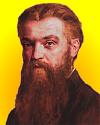 | "We may always depend on it that algebra, which cannot be translated into good English and sound common sense, is bad algebra." |
 | "Any one who is practically acquainted with scientific work is aware that those who refuse to go beyond fact, rarely get as far as fact." |
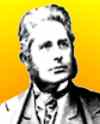 | "Tedious as it may appear to some to dwell on the discovery of odds and ends that have, no doubt, been thrown away by the owner as rubbish ... yet it is by the study of such trivial details that Archaeology is mainly dependent for determining the date of earthworks." On the importance of pottery to an archaeologist. |
| QUIZ | |
| Before you look at today's web page, see if you can answer some of these questions about the events that happened on this day. Some of the names are very familiar. Others will likely stump you. Tickle your curiosity with these questions, then check your answers on today's web page. | |
| Births | |
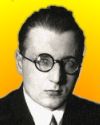 |  On 4 May 1899, Fritz von Opel was born He became a German automotive industrialist, but he had an interest in another form of transport propulsion. On 4 May 1899, Fritz von Opel was born He became a German automotive industrialist, but he had an interest in another form of transport propulsion. Can you name the novel automobile propulsion? Can you name the novel automobile propulsion? |
 |  On 4 May 1825, Thomas Henry Huxley was born, an English biologist who was the best-known supporter of Charles Darwin and his theory of evolution. In 1860, he debated a Bishop on the subject, at the British Association for the Advancement of Science. Challenged by the Bishop as to whether he traced his ancestry to the apes, Huxley famously gave the withering reply that given the choice of a miserable ape and a man who could make such a remark at a serious scientific gathering, he would select the ape. On 4 May 1825, Thomas Henry Huxley was born, an English biologist who was the best-known supporter of Charles Darwin and his theory of evolution. In 1860, he debated a Bishop on the subject, at the British Association for the Advancement of Science. Challenged by the Bishop as to whether he traced his ancestry to the apes, Huxley famously gave the withering reply that given the choice of a miserable ape and a man who could make such a remark at a serious scientific gathering, he would select the ape. Can you name the Bishop? Can you name the Bishop? |
| Deaths | |
 |  An Englishman (1827-1900), who was often called the "father of British archaeology," stressed the need for total excavation of sites, thorough stratigraphic observation and recording,. An Englishman (1827-1900), who was often called the "father of British archaeology," stressed the need for total excavation of sites, thorough stratigraphic observation and recording,.  Can you name this archaeologist? Can you name this archaeologist? |
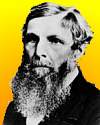 |  William Froude (1810-79) was an English engineer began by working for the British railway system as a civil engineer, but a few years later began a career as a naval engineer. He was a laboratory scientist whose work was of great value to the British navy. William Froude (1810-79) was an English engineer began by working for the British railway system as a civil engineer, but a few years later began a career as a naval engineer. He was a laboratory scientist whose work was of great value to the British navy. What problem did he address, and what technique did he use? What problem did he address, and what technique did he use? |
| Events | |
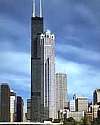 |  In 1973, this U.S. building topped out at 1,454-ft tall. In fact it is 1,707-ft tall if its twin antennas are included, making it taller than the Empire State Building in New York. In 1973, this U.S. building topped out at 1,454-ft tall. In fact it is 1,707-ft tall if its twin antennas are included, making it taller than the Empire State Building in New York. Can you name the building? And in what city was it built? Can you name the building? And in what city was it built? |
 In 1886, three patents were issued to Chichester Bell and Charles S. Tainter concerning their invention. Thomas Edison's invention preceded theirs, but the newly patented invention used an approach that made a more practical design that replaced Edison's, and was used for many years. In 1886, three patents were issued to Chichester Bell and Charles S. Tainter concerning their invention. Thomas Edison's invention preceded theirs, but the newly patented invention used an approach that made a more practical design that replaced Edison's, and was used for many years. What was the invention? What was the invention? | |
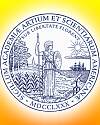 |  Since 1780, when this U.S. society was chartered, to the present day, it has had many famous people as its members. Since its early days when its membership included the likes of Benjamin Franklin, George Washington, numerous notable scientists have been enrolled. To say that the society is known by its initials AAAS will make it an easier question to answer. Since 1780, when this U.S. society was chartered, to the present day, it has had many famous people as its members. Since its early days when its membership included the likes of Benjamin Franklin, George Washington, numerous notable scientists have been enrolled. To say that the society is known by its initials AAAS will make it an easier question to answer. Can you give the full name of this society? Can you give the full name of this society? |
| Answers |
When you have your answers ready to all the questions above, you'll find all the information to check them, and more, on the May 4 web page of Today in Science History. Or, try this link first for just the brief answers. Fast answers for the previous newsletter for May 3: he formulated the electroweak theory, which explains the unity of electromagnetism with the weak nuclear force; that electrons exhibit the wave-like property of diffraction; war; Rocky Mountain spotted fever; heart transplant. |
| Feedback |
 If you enjoy this newsletter, the website, or wish to offer encouragement or ideas, please send feedback by using your mail reader Reply button. If you enjoy this newsletter, the website, or wish to offer encouragement or ideas, please send feedback by using your mail reader Reply button. |
--
If you do not want to receive any more newsletters, Unsubscribe
To update your preferences and to unsubscribe visit this link



Δεν υπάρχουν σχόλια:
Δημοσίευση σχολίου